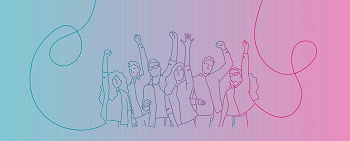 The department dedicated to Adolescents and Young Adults (AYA) at the Jules Bordet Institute supports young people with cancer aged between 16 and 35.
The department dedicated to Adolescents and Young Adults (AYA) at the Jules Bordet Institute supports young people with cancer aged between 16 and 35.
To be facing cancer between the ages of 16 and 35 means living with the disease at the very time you are building an identity, acquiring autonomy, developing career pathways, forming friendships and entering into romantic relationships or starting a family. The diagnosis and treatment can impact on all these fundamental aspects of a young person’s life, with a lasting effect on their physical or mental health, self image, social relations and how they see the future.
It is essential to provide specific care that meets the psychosocial, emotional and medical needs of these patients that are quite distinct from those of children or older adults.
Our mission is to propose personalised support that focuses on the specific needs of each and every young person by offering comprehensive support: medical, psychological, social and human.
We help patients confront the questions likely to arise in the course of their care pathways: How to manage studies or work? How to conserve fertility? How to maintain social life, build a family, or simply feel comfortable in your own skin? How to live post cancer?
Thanks to a holistic approach, our team takes every aspect of a patient’s life into account, proposing an adapted care pathway in a supportive environment.
The AYA team brings together a range of specialists to provide a coordinated response to these specific issues. This multidisciplinary approach enables each situation to be addressed comprehensively and coherently:
Here are the key elements of our support :
- A dedicated consultation with a designated nurse who will be a first point of contact, ready to listen and assess specific needs. This nurse play a central role in coordination, the provision of information and supporting young patients.
- Personalised psychosocial support to help young people steer a course through their illness, understand their experiences and find the resources to face this reality.
- Early referral to reproductive medicine to approach fertility with serenity.
- Access to genetic advice to better understand individual cancer risk and adapt the prevention and treatment strategies accordingly.
- Opportunities to participate in clinical trials so as to benefit from the latest progress in treatment.
Every young person is unique and our aim is to propose support that respects the rhythm, choices and priorities of the individual while working closely together with the medical teams and external partners if necessary.
Our team does not stop at care for patients: it also invests in training the care staff.
Why? Because adolescents and young adults with cancer have specific needs that are quite different to those of children or older adults. It is therefore essential for all members of the medical and paramedical staff to be aware of these particularities.
The team professionals share their experience in the field through training, workshops or actions outside the hospital. They transmit the keys for a better understanding of this age group, better communication with young people and care adapted to their reality
Training is also a question of developing practices so that every young patient is welcomed, heard and supported in a respectful, comprehensive and coherent manner throughout their pathway.
The AYA team is participating in the research project titled “Online group training programme in resilience, ecologically strengthened and programmed in the initial period of cancer treatment in Adolescents and Young Adults (AYA) with cancer: a longitudinal multicentre randomised control trial”.
Adolescents and young adults with cancer suffer prolonged stress that could have a lasting effect on their central nervous system, immune system and mental and physical health. Resilience, defined as “the process of adapting in the face of adversity”, can be strengthened by improving cognitive, emotional, social, behavioural and neuronal resources. This project aims to test the effectiveness of an online resilience training programme (RTP) for AYA, designed to be used from the start of cancer treatment. The programme will include online group sessions and incentives via an online application to include strategies to protect against stress in daily life. The RTP content was developed with the AYA and their families and carers. The effectiveness will be measured by a multicentre randomised control trial, with evaluations one month and six months after diagnosis of emotional health, social functioning and cognitive impairments due to cancer.
The team
- Doctor: Sarah Buntinx
- Nurse: Lucie Dufresne
- Psychologists : Lucie Ponsard and Yves Libert
- Social worker: Loïc Veys
